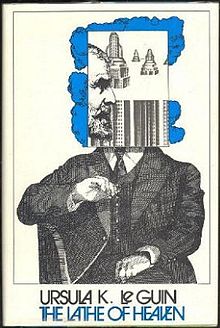
Here’s a pretty picture of the Amazon from KHS applied geography.
I woke up this morning, made myself a cup of tea, then discovered a wall-of-text e-mail from Amazon in my inbox. You can see the entire wall of text in this blog post below, but here’s the gist: Amazon is reaching out to its authors via e-mail to portray itself as the good guy in the Amazon-Hachette fight. And would I please undermine this campaign by publicly voicing my support for Amazon?
No, I won’t.
The fight between Amazon and Hachette (a large traditional book publisher) is a thorny issue. For those who haven’t been following it, we don’t know the details of the dispute because neither side is publicly airing them. But we can be reasonably sure that the fight is about money. Large book publishers want to price e-books at $14.99 or $19.99, or the same price as a hardcover book. Amazon wants to sell e-books for much cheaper.
Back in 2012, Amazon sued Apple, accusing it of colluding with other e-book publishers to raise the price of e-books. In 2013 it won the suit. A few weeks ago, in its ongoing fight with Hachette to make e-books cheaper, Amazon made all the Hachette books on its site mysteriously unbuyable. The writing community freaked out. Now Amazon has a public relations problem on its hands.
In the long e-mail I got this morning, Amazon portrays itself as a crusader against corrupt corporate executives who want to make e-books too expensive. While I agree that colluding to raise the price of e-books wasn’t very nice, it’s also over. Amazon already won that lawsuit. And throwing your weight around as the world’s largest online retailer of books to lower book prices isn’t very nice, either.
Right now, the fight’s about money. But how do I know that in the future, Amazon won’t make books that it doesn’t like disappear?
So no, I won’t rally to Amazon’s banner with this blog post. In fact, I’m going to use this space to make a plug for Calibre. It’s free, feature-rich, and easy-to-use software that lets you manage your e-book collection. The best part is that it easily lets you convert e-books from one industry file format to another. So you can, you know, read e-books from other retailers on your Kindle.
So, without further ado…
The excessively-long e-mail from Amazon.com
Dear KDP Author,
Just ahead of World War II, there was a radical invention that shook the foundations of book publishing. It was the paperback book. This was a time when movie tickets cost 10 or 20 cents, and books cost $2.50. The new paperback cost 25 cents – it was ten times cheaper. Readers loved the paperback and millions of copies were sold in just the first year.
With it being so inexpensive and with so many more people able to afford to buy and read books, you would think the literary establishment of the day would have celebrated the invention of the paperback, yes? Nope. Instead, they dug in and circled the wagons. They believed low cost paperbacks would destroy literary culture and harm the industry (not to mention their own bank accounts). Many bookstores refused to stock them, and the early paperback publishers had to use unconventional methods of distribution – places like newsstands and drugstores. The famous author George Orwell came out publicly and said about the new paperback format, if “publishers had any sense, they would combine against them and suppress them.” Yes, George Orwell was suggesting collusion.
Well… history doesn’t repeat itself, but it does rhyme.
Fast forward to today, and it’s the e-book’s turn to be opposed by the literary establishment. Amazon and Hachette – a big US publisher and part of a $10 billion media conglomerate – are in the middle of a business dispute about e-books. We want lower e-book prices. Hachette does not. Many e-books are being released at $14.99 and even $19.99. That is unjustifiably high for an e-book. With an e-book, there’s no printing, no over-printing, no need to forecast, no returns, no lost sales due to out of stock, no warehousing costs, no transportation costs, and there is no secondary market – e-books cannot be resold as used books. E-books can and should be less expensive.
Perhaps channeling Orwell’s decades old suggestion, Hachette has already been caught illegally colluding with its competitors to raise e-book prices. So far those parties have paid $166 million in penalties and restitution. Colluding with its competitors to raise prices wasn’t only illegal, it was also highly disrespectful to Hachette’s readers.
The fact is many established incumbents in the industry have taken the position that lower e-book prices will “devalue books” and hurt “Arts and Letters.” They’re wrong. Just as paperbacks did not destroy book culture despite being ten times cheaper, neither will e-books. On the contrary, paperbacks ended up rejuvenating the book industry and making it stronger. The same will happen with e-books.
Many inside the echo-chamber of the industry often draw the box too small. They think books only compete against books. But in reality, books compete against mobile games, television, movies, Facebook, blogs, free news sites and more. If we want a healthy reading culture, we have to work hard to be sure books actually are competitive against these other media types, and a big part of that is working hard to make books less expensive.
Moreover, e-books are highly price elastic. This means that when the price goes down, customers buy much more. We’ve quantified the price elasticity of e-books from repeated measurements across many titles. For every copy an e-book would sell at $14.99, it would sell 1.74 copies if priced at $9.99. So, for example, if customers would buy 100,000 copies of a particular e-book at $14.99, then customers would buy 174,000 copies of that same e-book at $9.99. Total revenue at $14.99 would be $1,499,000. Total revenue at $9.99 is $1,738,000. The important thing to note here is that the lower price is good for all parties involved: the customer is paying 33% less and the author is getting a royalty check 16% larger and being read by an audience that’s 74% larger. The pie is simply bigger.
But when a thing has been done a certain way for a long time, resisting change can be a reflexive instinct, and the powerful interests of the status quo are hard to move. It was never in George Orwell’s interest to suppress paperback books – he was wrong about that.
And despite what some would have you believe, authors are not united on this issue. When the Authors Guild recently wrote on this, they titled their post: “Amazon-Hachette Debate Yields Diverse Opinions Among Authors” (the comments to this post are worth a read). A petition started by another group of authors and aimed at Hachette, titled “Stop Fighting Low Prices and Fair Wages,” garnered over 7,600 signatures. And there are myriad articles and posts, by authors and readers alike, supporting us in our effort to keep prices low and build a healthy reading culture. Author David Gaughran’s recent interview is another piece worth reading.
We recognize that writers reasonably want to be left out of a dispute between large companies. Some have suggested that we “just talk.” We tried that. Hachette spent three months stonewalling and only grudgingly began to even acknowledge our concerns when we took action to reduce sales of their titles in our store. Since then Amazon has made three separate offers to Hachette to take authors out of the middle. We first suggested that we (Amazon and Hachette) jointly make author royalties whole during the term of the dispute. Then we suggested that authors receive 100% of all sales of their titles until this dispute is resolved. Then we suggested that we would return to normal business operations if Amazon and Hachette’s normal share of revenue went to a literacy charity. But Hachette, and their parent company Lagardere, have quickly and repeatedly dismissed these offers even though e-books represent 1% of their revenues and they could easily agree to do so. They believe they get leverage from keeping their authors in the middle.
We will never give up our fight for reasonable e-book prices. We know making books more affordable is good for book culture. We’d like your help. Please email Hachette and copy us.
Hachette CEO, Michael Pietsch: Michael.Pietsch@hbgusa.com
Copy us at: readers-united@amazon.com
Please consider including these points:
– We have noted your illegal collusion. Please stop working so hard to overcharge for ebooks. They can and should be less expensive.
– Lowering e-book prices will help – not hurt – the reading culture, just like paperbacks did.
– Stop using your authors as leverage and accept one of Amazon’s offers to take them out of the middle.
– Especially if you’re an author yourself: Remind them that authors are not united on this issue.
Thanks for your support.
The Amazon Books Team
P.S. You can also find this letter at www.readersunited.com




